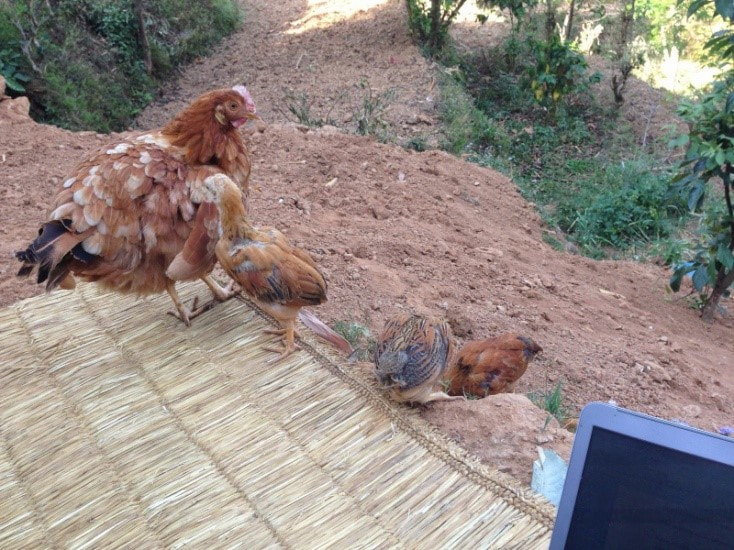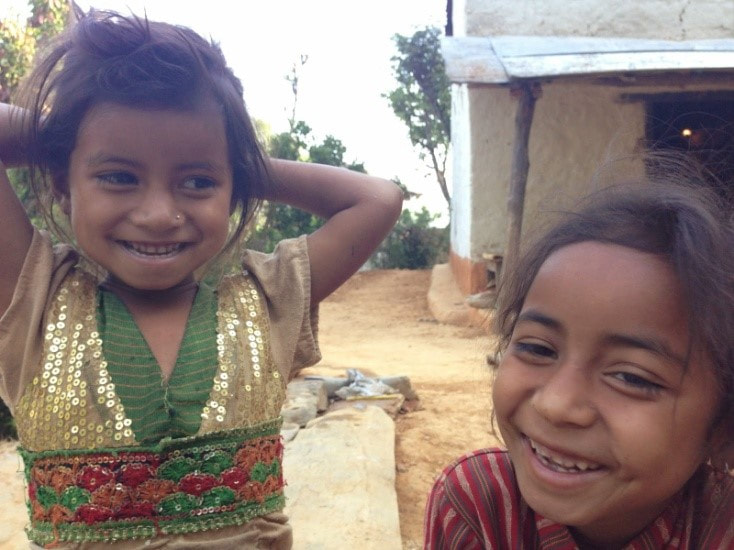Another Everest by Lisa Baker
Dawn breaks early here in the foothills of the Himalayas this time of year, and life revolves around the sun’s schedule. Determined to fit in as much as possible—and it is barely possible—I tidy my sleeping pallet, give the dirt floor a sweep, make a cursory glance looking for evidence of the creature that landed on my legs in the dark of night, and finding none, head outside to sit on a rush mat among the chickens in the yard, though it is not yet 5am.
After several mornings of practice, I can receive my boiling hot cup of tea in a handle-less tin cup without yelping and can shut the water buffalo that just moments ago gave its milk for my tea out of my mind. An appreciative smile is the best I have for the near-total language barrier between me and my kind host family. Outsiders are not seen in this mountain village of 34 families at the end of a series of goat trails, and I am grateful they have allowed me to come at all.
Masters of overcoming language and cultural barriers of all kinds, the two darling granddaughters of the house, ages six and eight, have instantly adopted me as their plaything. With their gap-toothed grins and antics standard to children of their age, they communicate everything that could possibly be important: Do you see us? Do you want to know us? Do you love us? They pull out all the stops, and whether I’m watching them playing the Nepali variant of jacks, climbing trees to get leaves to show me how to make a whistle, or pretending to be a cat, it continually strikes me that they are LITTLE GIRLS.
Children.
Innocent and funny and lovely. Free of the cares of the adult world. The way all children come into this world.
And I am weighed down by the knowledge that that all over Nepal, and especially in this district, girls their age are forced into marriage, or trafficked for hard labor or prostitution. Fortunately for these two, that is not their fate. On the contrary, they are cherished daughters, unlike most girls here, and their education is of paramount importance in their family, as evidenced by the morning scene where the younger is literally and quite comically chased to school by her mother, her little-girl wails echoing over the mountain all the way.
While the children are at school, dressed in a long dress and flip flops, we hike to the next village. Hiking in the Himalayas in flip flops? And a long dress? File this under “I didn’t see that coming,” but somehow this is appropriate garb here, and surprisingly it works. We spend the day going from home to home, so I can see how people live and take in their stories. In every home, I am overwhelmed by their hospitality, their insistence on giving me the spot with the best shade, the nicest mat. Their consideration for my stomach’s inability to handle local water has my hosts trekking not-insignificant distances to bring me back a safe drink in the form of a warm soda. In the face of their obvious poverty, it’s all I can do to not insist on paying, but I have been informed this would be insulting, and so I express my gratitude as fully as smiles and gestures allow, and drink every drop.
We meet women who have traded their own daughters for a tin roof. Women whose fathers or uncles traded them to a husband far older to relieve themselves of the burden of a daughter. Women whose husbands who abandoned them to destitution for birthing a daughter. I hear how educating a girl is considered to be “teaching her to paint another man’s house,” since her husband’s family will be the ones to benefit, and thus it is not worth the expense. Stories of traffickers who show up with promises of good jobs abroad, who prey on their desperation, and then take women to a brothel instead. Or make promises that they can get their children educated if they will send them to a city, only to have any children handed over trafficked for labor in brick factories, into sex work, or even into international adoptions. Most of the time when women or children leave, they are not heard from again, and statistics estimate only one percent are ever rescued, so it has taken time for stories of their true fates to make it back to the village. And despite these stories, many are willing to take their chances, to hope beyond hope that the promises of a good job or education for their children could be true.
Each word is an additional weight on my heart, as the magnitude of the situation becomes tangible before my very eyes. It would be so easy to feel hopeless, but I have also been deeply inspired by the people who are fighting for change. My 22-year-old guide is working tirelessly, often hiking and climbing for hours to get to villages frequently targeted, to teach them how to protect themselves, and to rally change in how girls and women are treated. During our long dusty hike back to her village, we discuss how to best effect these changes, what the obstacles are, even in the hearts of the women we’ve met today. It is heavy conversation, but also laced with hope. We believe change can come to Nepal. We have to.
At the end of the day, I am back on my mat among the chickens. As the sun goes down, and the little ones are ushered into the house, I look forward to the next morning’s routine, prepared to celebrate the beauty of a daughter chased to school.













